
Nov 4
/
Laleska Moda
EU stocks increase, but remain below average levels
Back to main blog page
- The last report of the European Coffee Federation (ECF) indicated that EU stocks recovered over the previous months. Interestingly, there was a significant increase in robusta and washed arabica types on stocks.
- Despite the increase, stocks continue to be below 2023 and average levels. However, considering current import and demand levels, there might still be room for a recovery from last year's levels in the coming months.
- European coffee imports significantly increased over Q2 and Q3 compared to previous years, likely due to the EUDR effect, and could show a positive performance on Q4.
- On the demand side, while apparent consumption is higher than average levels, it remain below 21/22 and 22/23 cumulative.
- While there is still expectation of higher stocks levels in the coming months, due to an increase in imports, current demand levels indicate that the recovery is still limited.
EU stocks increase, but remain below average levels
Data from the European Coffee Federation (ECF) indicates a recovery in EU coffee stocks in August, to 8.85 M bags of coffee, after reaching its lowest levels early this year. All types of coffee stocks increased, but especially from robusta and washed arabica, in line with higher imports from Central America, East Africa, and Brazil between April and August, origins that export these type of beans.
However, despite the increase, EU stocks remain below 2023 and historic average levels. While is unlikely that the stocks will come back to average levels any time soon, there might still be room for a recovery from last year's levels in the coming months. The main reason is the recent import pace and current apparent demand estimates.
European Union Stocks - ECF (M bags)
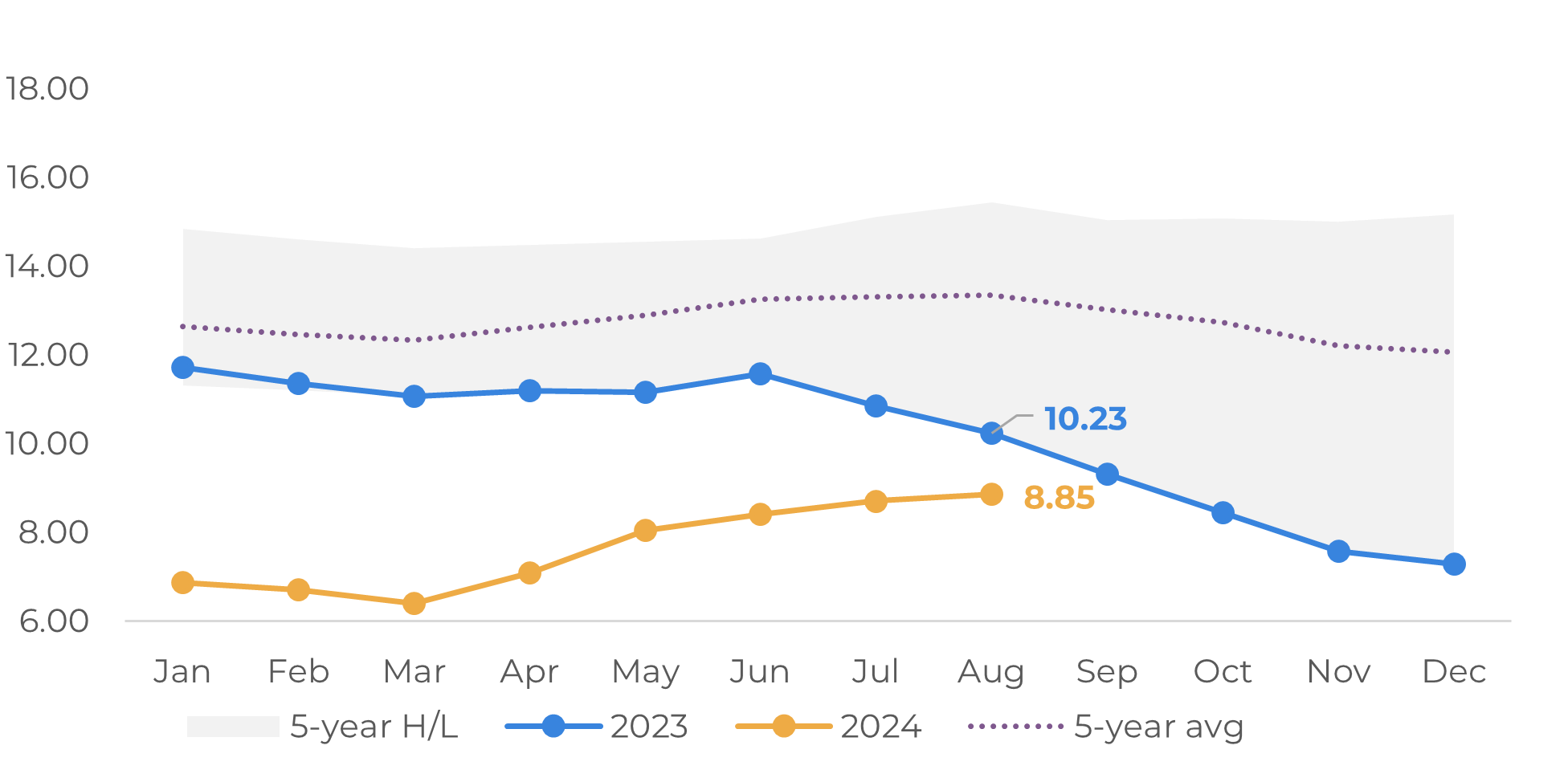
Source: ECF
European Union Stocks – by Type of Coffee (M bags)
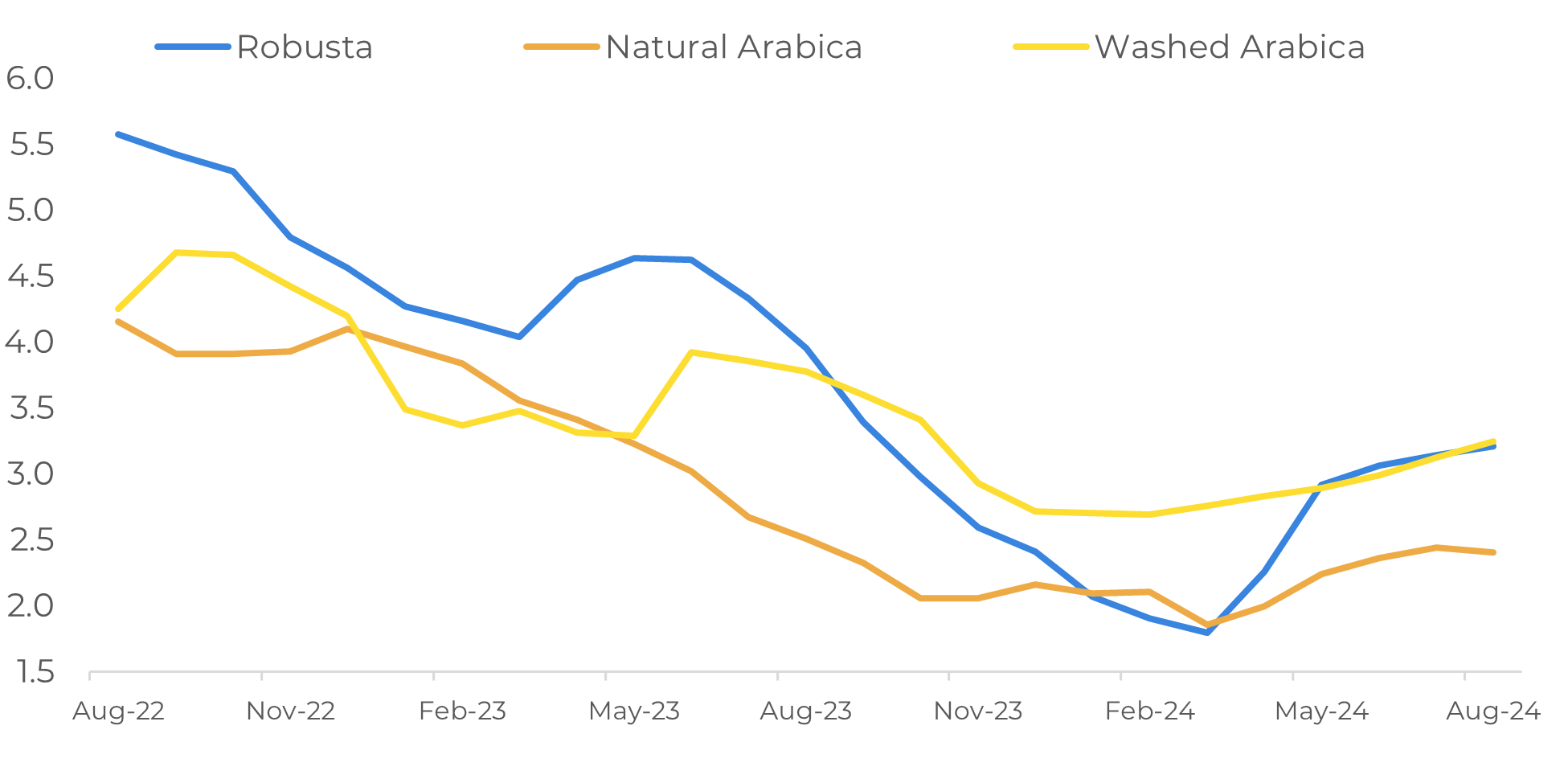
Source: ECF
Since early 2024 European imports have risen, reflecting the worries over lower stocks – in March, the inventories were at 6.4 M, the lowest levels in decades – and the upcoming EUDR implementation in December. This also drove a substantial increase in Brazilian coffee imports, particularly as supplies from other origins tightened during their off-season. This was mainly observed with robusta imports, which remained above average levels through the first half of 2024. This trend may also be reflected in the notable recovery of robusta stocks from April onward.
Looking at cumulative European Imports throughout the quarters, it is also interesting to note that the volume in Q2 and Q3 was above past season levels, indicating a higher import rate in the past months. Although the possible postponement of the EUDR could lead to a reduction in European demand in the coming months, Q4 is likely to record a significant volume as much of this coffee was already purchased before the Commission proposed the delay.
EU: Imports by country/gourp (000’ bags)
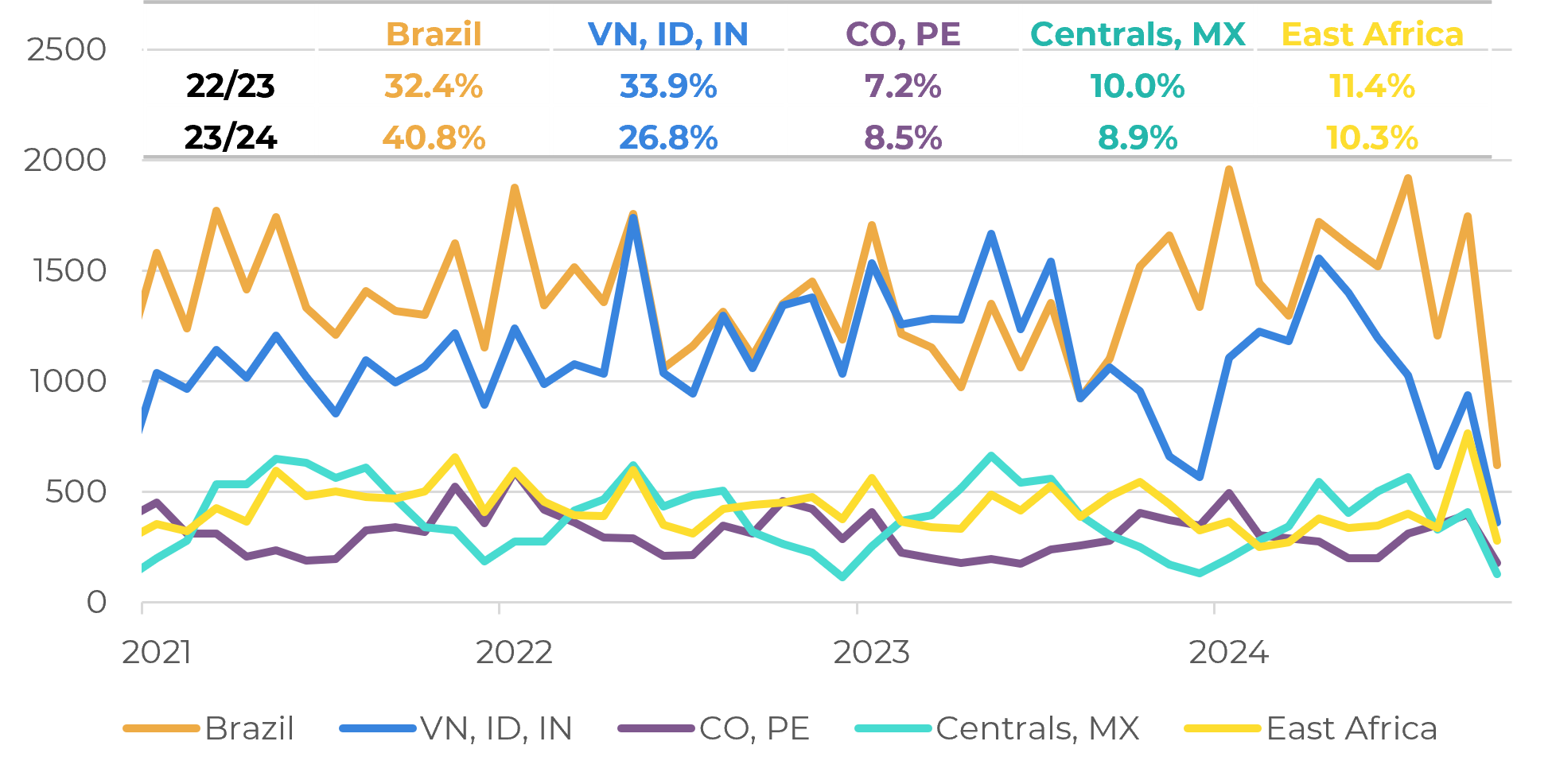
Source: Eurostat, Agridata
EU: Share of imports by type of coffee
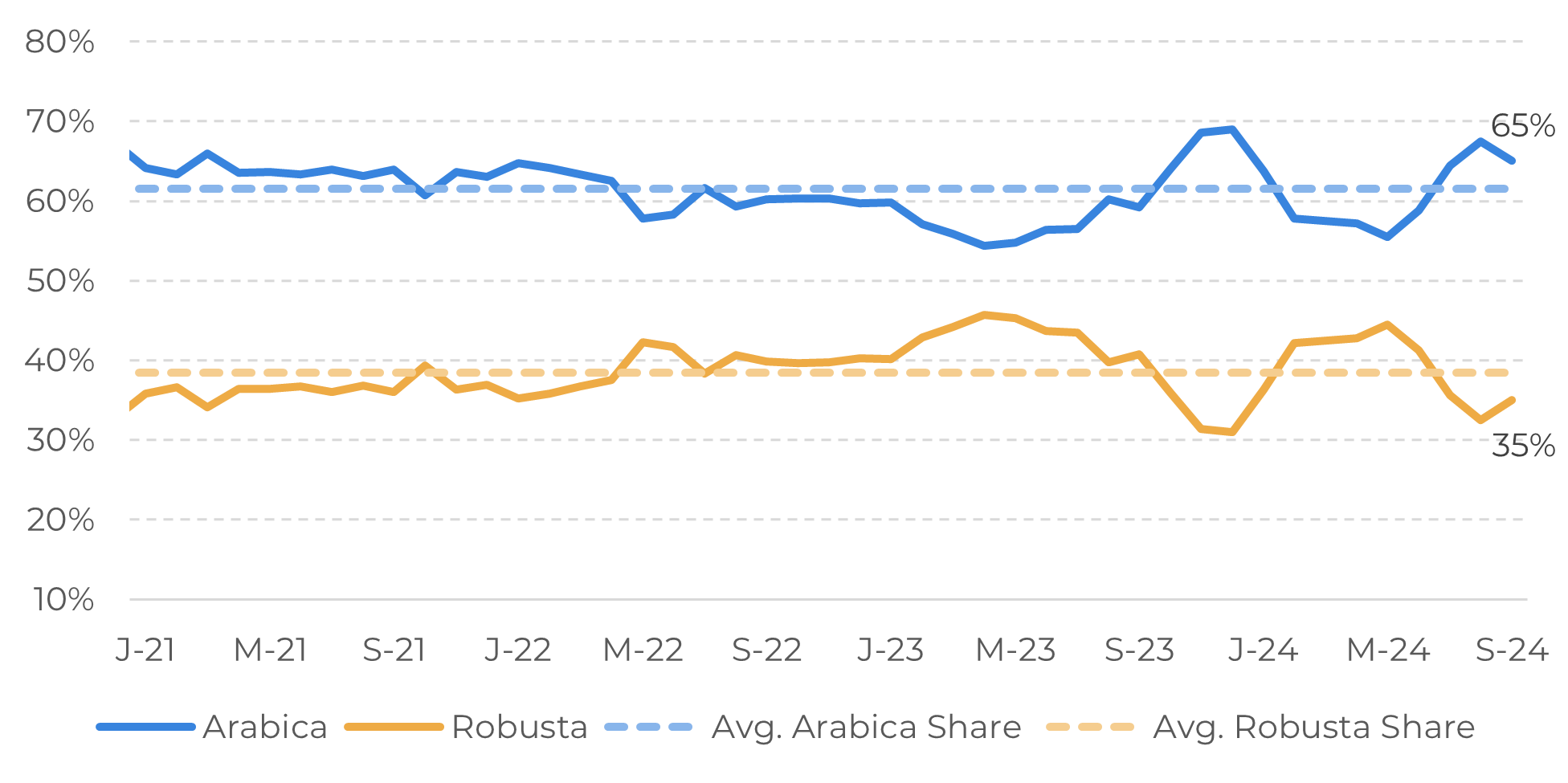
Source: Eurostat, Agridata
As mentioned before, this could also contribute to the recovery in EU stocks. Interestingly, when looking at the spread on robusta contracts, up until recently, the X-F spread was trading at its highest levels in years, but there was an inversion in recent weeks, likely reflecting the expectations of more comfortable supply of the variety, with the increase in global exports of the bean, recovering stocks and the upcoming Vietnamese harvest.
As for the arabica spread, they are below 2022 and late 2023 levels – when there was an increased perception of lower supply – but the Z-H spread is indicating a slight worry on the production side, as there still uncertainty over the 25/26 crop in Brazil, although weather has been more favorable and could lead to downward pressure on prices in the coming weeks.
LN Robusta X-F Spread – Seasonal Chart (USD/mt)
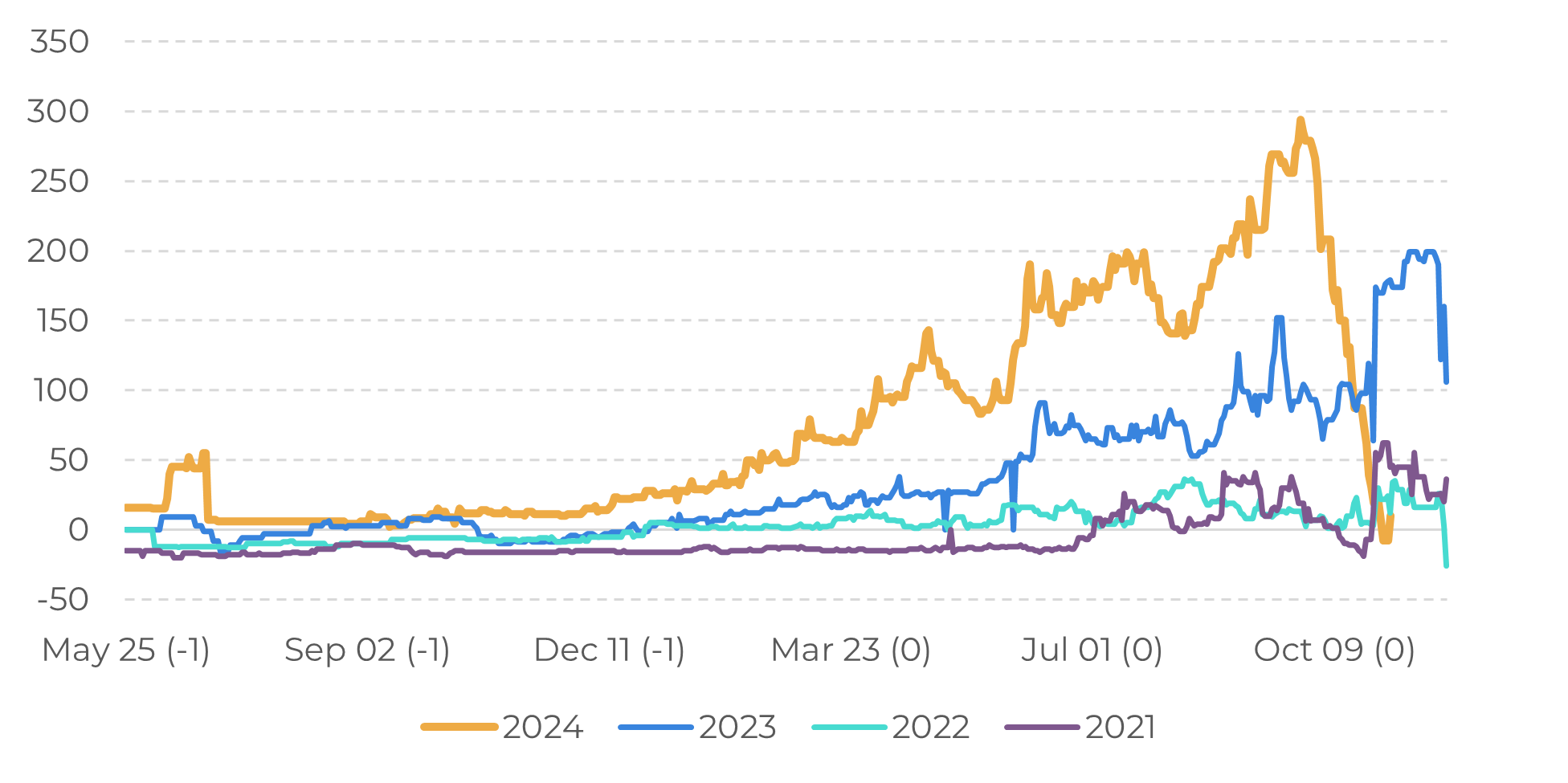
Source: Refinitiv
NY Arabica Z-H Spread – Seasonal Chart (c/lb)
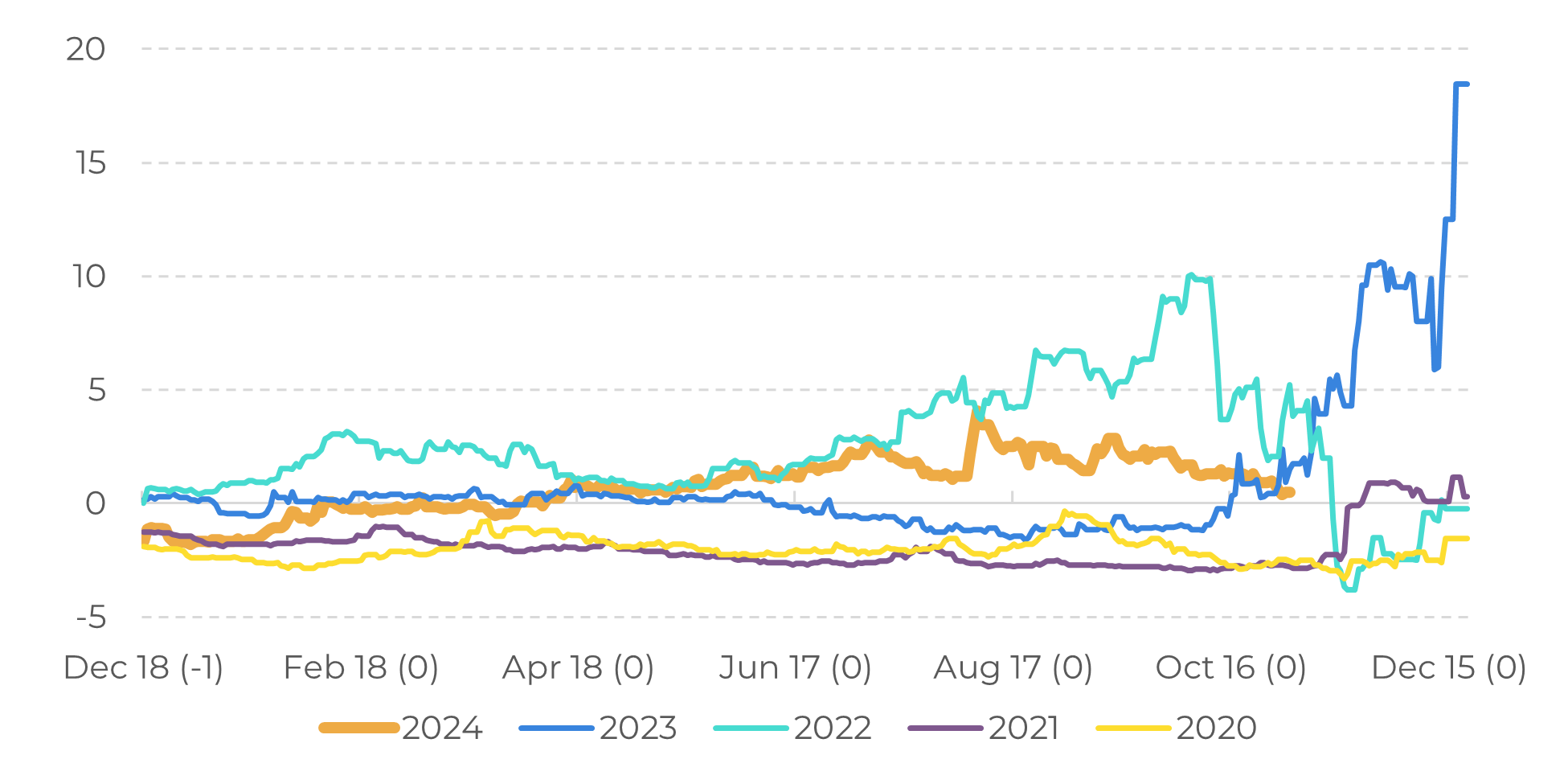
Source: Refinitiv
On the other side, it is also important to remember that European (and other destinations) inventories are unlikely to return to average levels, due to a still resilient demand. In the EU, for example, apparent demand in the 23/24 season (Oct/23 – Aug/24) indicates that, while still below 22/23, consumption is already above previous season and average levels, at 40.4 M bags. Its also worth remembering that we are heading to the North Hemisphere winter, when coffee demand tends to grow.
EU: Total Coffee Imports by quarter (M bags)
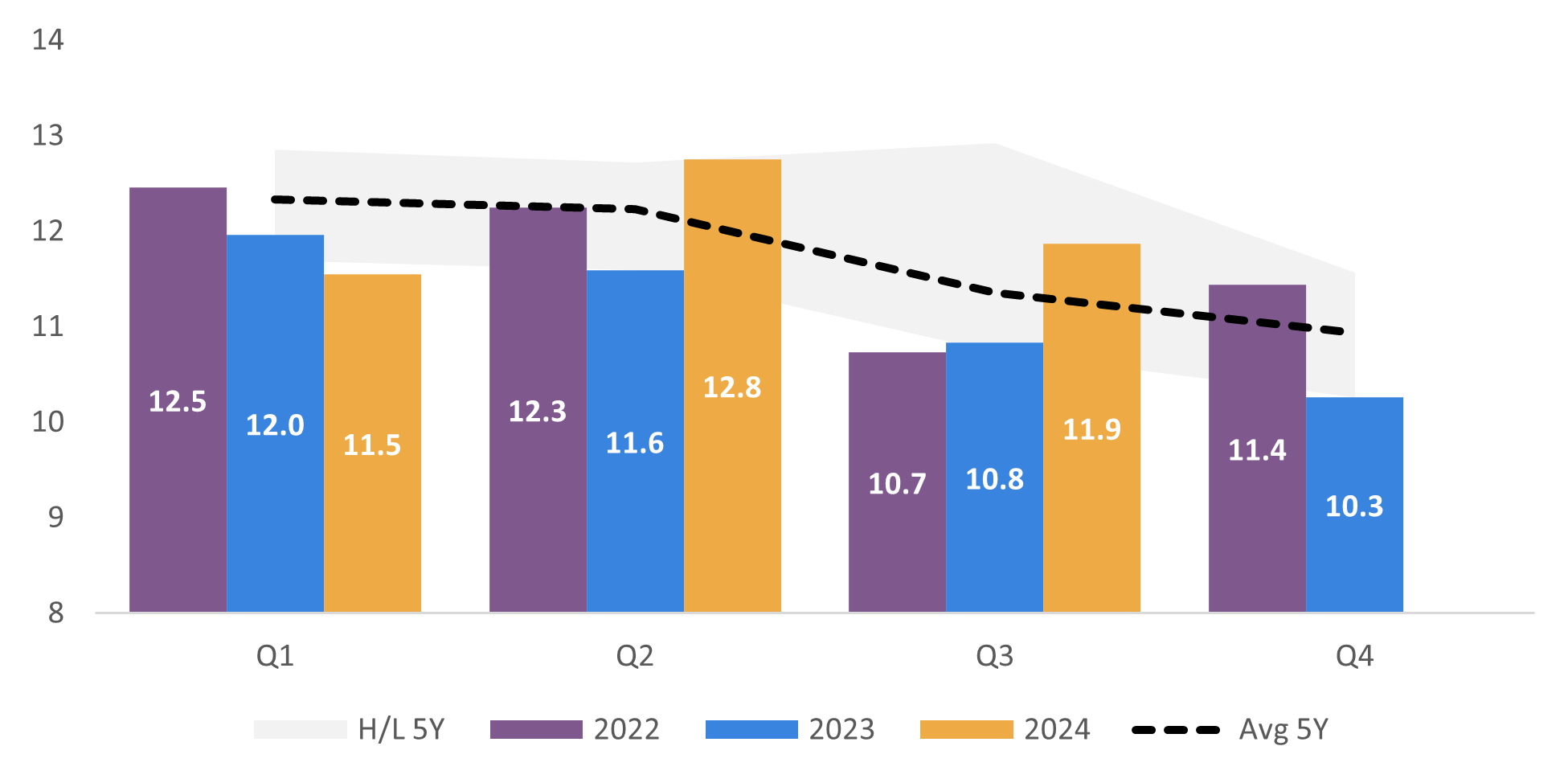
Source: Eurostat, Agridata
EU: Aparent Consumption (M bags)
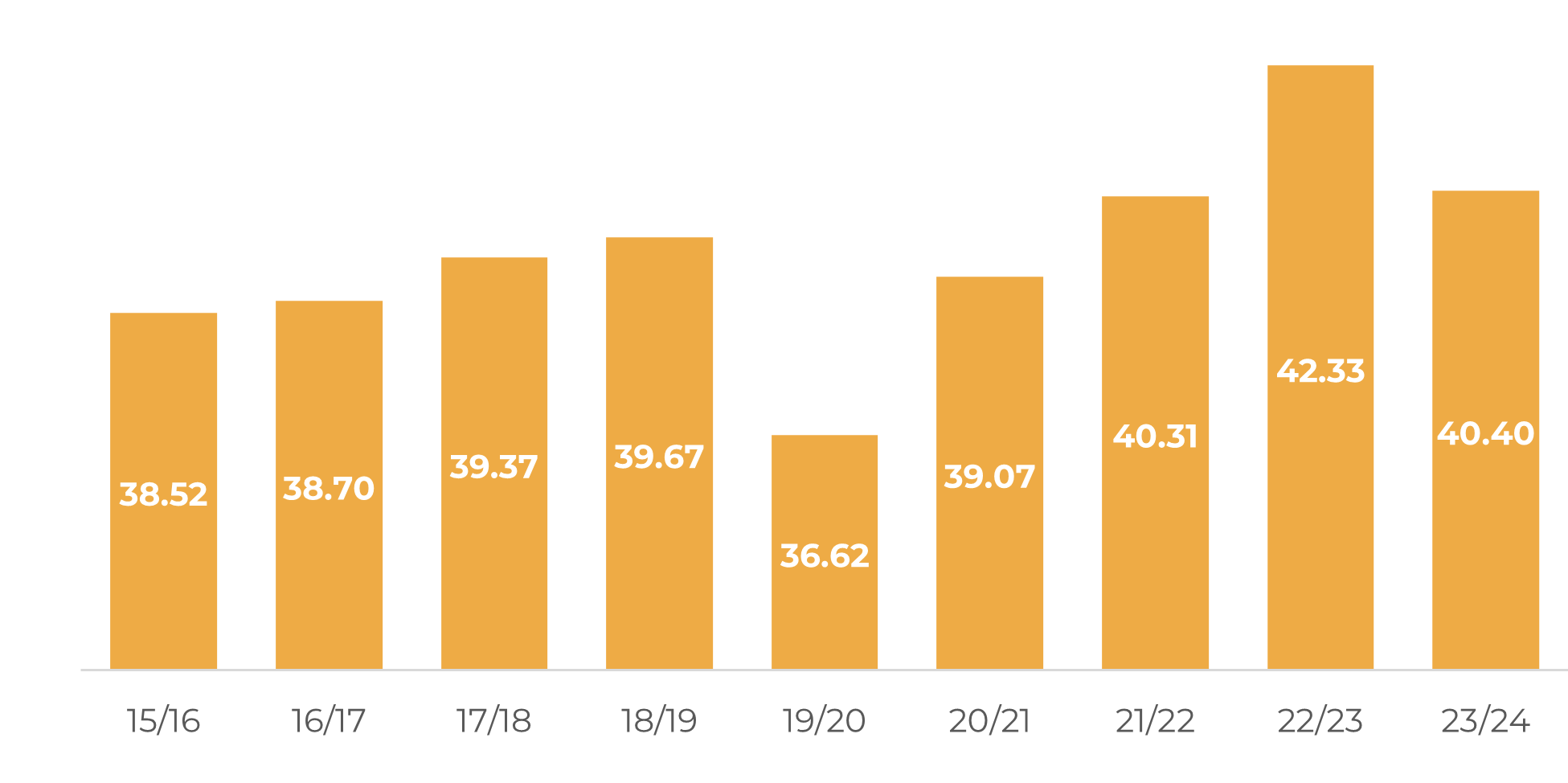
Source: Hedgepoint
In Summary
The ECF stocks indicate a recovery from April to August, in line with the increase of EU imports in 2024. Although the potential postponement of the EUDR could lead to a decrease in imports in the short term, this year is still likely to record higher European imports, which could, in turn, benefit a further increase in EU stocks.
This expectation of an easing in the supply side has also been reflected in future prices, especially with the return of the rains in Brazil and the upcoming 24/25 robusta harvest in Vietnam.
On the other hand, apparent consumption in the EU has shown resilience. While below 22/23, consumption is still above average levels, which may limit European stocks' recovery in the medium term. While this scenario is similar in other destinations, in origins, we still expect a decrease in stocks in the 24/25 season, possible giving some support to prices on the long term.
Weekly Report — Coffee
Written by Laleska Moda
laleska.moda@hedgepointglobal.com
Reviewed by Livea Coda
livea.coda@hedgepointglobal.com
livea.coda@hedgepointglobal.com
www.hedgepointglobal.com
Disclaimer
This document has been prepared by Hedgepoint Global Markets LLC and its affiliates (“HPGM”) solely for informational and instructional purposes, without the purpose of instituting obligations or commitments to third parties, nor is it intended to promote an offer, or solicitation of an offer of sale or purchase relating to any securities, commodities interests or investment products. Hedgepoint Commodities LLC (“HPC”), a wholly owned entity of HPGM, is an Introducing Broker and a registered member of the National Futures Association. The trading of commodities interests such as futures, options, and swaps involves substantial risk of loss and may not be suitable for all investors. Past performance is not necessarily indicative of future results. Customers should rely on their own independent judgement and outside advisors before entering in any transaction that are introduced by the firm. HPGM and its associates expressly disclaim any use of the information contained herein that directly or indirectly result in damages or damages of any kind. In case of questions not resolved by the first instance of customer contact (client.services@hedgepointglobal.com), please contact our internal ombudsman channel (ombudsman@hedgepointglobal.com) or 0800-878- 8408/ouvidoria@hedgepointglobal.com (only for customers in Brazil)
Contact us
hedgepointhub.support@hedgepointglobal.com
ouvidoria@hedgepointglobal.com
Funchal Street, 418, 18º floor - Vila Olímpia São Paulo, SP, Brasil
Check our general terms and important notices.
This page has been prepared by Hedgepoint Schweiz AG and its affiliates (“Hedgepoint”) solely for informational and instructional purposes, without the purpose of instituting obligations or commitments to third parties, nor is it intended to promote an offer, or solicitation of an offer of sale or purchase relating to any securities, commodities interests or investment products. Hedgepoint and its associates expressly disclaim any use of the information contained herein that directly or indirectly result in damages or damages of any kind. Information is obtained from sources which we believe to be reliable, but we do not warrant or guarantee the timeliness or accuracy of this information. The trading of commodities interests such as futures, options, and swaps involves substantial risk of loss and may not be suitable for all investors. You should carefully consider wither such trading is suitable for you in light of your financial condition. Past performance is not necessarily indicative of future results. Customers should rely on their own independent judgement and/or advisors before entering in any transaction.Hedgepoint does not provide legal, tax or accounting advice and you are responsible for seeking any such advice separately.Hedgepoint Schweiz AG is organized, incorporated, and existing under the laws of Switzerland, is filiated to ARIF, the Association Romande des Intermédiaires Financiers, which is a FINMA-authorized Self-Regulatory Organization. Hedgepoint Commodities LLC is organized, incorporated, and existing under the laws of the USA, and is authorized and regulated by the Commodity Futures Trading Commission (CFTC) and a member of the National Futures Association (NFA) to act as an Introducing Broker and Commodity Trading Advisor. HedgePoint Global Markets Limited is Regulated by the Dubai Financial Services Authority. The content is directed at Professional Clients and not Retail Clients. Hedgepoint Global Markets PTE. Ltd is organized, incorporated, and existing under the laws of Singapore, exempted from obtaining a financial services license as per the Second Schedule of the Securities and Futures (Licensing and Conduct of Business) Act, by the Monetary Authority of Singapore (MAS). Hedgepoint Global Markets DTVM Ltda. is authorized and regulated in Brazil by the Central Bank of Brazil (BCB) and the Brazilian Securities Commission (CVM). Hedgepoint Serviços Ltda. is organized, incorporated, and existing under the laws of Brazil. Hedgepoint Global Markets S.A. is organized, incorporated, and existing under the laws of Uruguay. In case of questions not resolved by the first instance of customer contact (client.services@Hedgepointglobal.com), please contact internal ombudsman channel (ombudsman@hedgepointglobal.com – global or ouvidoria@hedgepointglobal.com – Brazil only) or call 0800-8788408 (Brazil only).Integrity, ethics, and transparency are values that guide our culture. To further strengthen our practices, Hedgepoint has a whistleblower channel for employees and third-parties by e-mail ethicline@hedgepointglobal.com or forms Ethic Line – Hedgepoint Global Markets.Security note: All contacts with customers and partners are conducted exclusively through our domain @hedgepointglobal.com. Do not accept any information, bills, statements or requests from different domains and pay special attention to any variations in letters or spelling, as they may indicate a fraudulent situation.“HedgePoint” and the “HedgePoint” logo are marks for the exclusive use of HedgePoint and/or its affiliates. Use or reproduction is prohibited, unless expressly authorized by HedgePoint. Furthermore, the use of any other marks in this document has been authorized for identification purposes only. It does not, therefore, imply any rights of HedgePoint in these marks or imply endorsement, association or seal by the owners of these marks with HedgePoint or its affiliates.
We have updated our Terms & Conditions to reflect improvements to our platform, data handling practices, and the overall experience we provide to our clients.
To continue using the Hedgepoint HUB, please review and accept the updated terms.

